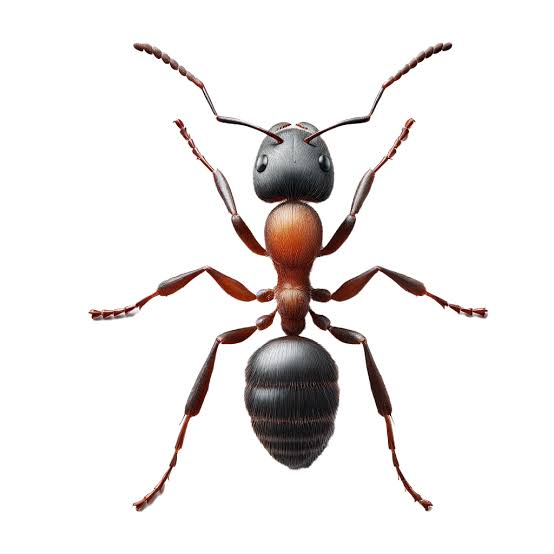Get Rid of Ants for Good: Explore Proven Control Techniques
Ant control methods are diverse and can be effective when used strategically. Here’s a comprehensive overview of the different ant control techniques: Ant Baits Ant baits are one of the most effective methods for eliminating entire ant colonies. These baits contain a mixture of food and a slow-acting poison that worker ants collect and bring…

Ant control methods are diverse and can be effective when used strategically. Here’s a comprehensive overview of the different ant control techniques:
Ant Baits
Ant baits are one of the most effective methods for eliminating entire ant colonies. These baits contain a mixture of food and a slow-acting poison that worker ants collect and bring back to their nest.
The key advantages of ant baits include:
- Targeted approach that kills the entire colony, including the queen
- Ants unknowingly transport the bait back to their nest
- Slow-acting poison allows ants to spread it throughout the colony before dying4
Ant Traps
Sticky ant traps use strong adhesive to capture ants, preventing them from escaping.
Important considerations include:
- Can be placed near windows, doors, and kitchen areas
- Some traps are specifically designed for different ant types (e.g., sugar ants)
- May not eliminate the entire colony, so best used in combination with other methods
Ant Sprays
Ant sprays come in two primary types:
- Contact Sprays: Kill ants immediately upon contact
- Non-Repellent Sprays: Ants cannot detect these sprays, allowing them to carry the insecticide back to the nest
Natural Alternatives
Several natural methods can help control ant infestations:
- Essential oils (peppermint, cinnamon, eucalyptus)
- White vinegar solution
- Baking soda or borax mixed with honey
- Diatomaceous earth
Professional Recommendations
Experts suggest combining methods for maximum effectiveness. For severe infestations, especially with carpenter ants, professional pest control is recommended.
Safety Note: Always read product labels carefully, especially when using treatments in homes with pets or children.
What are the best ant baits for indoor use
| Product | Features | Ideal For |
|---|---|---|
| Advion Ant Bait Gel | Targets a wide range of ants with a non-repellent formula; ensures colony eradication. | Severe infestations; precise application. |
| Terro Liquid Ant Baits | Pre-filled stations with borax; effective for common household ants. | Easy placement; versatile indoor use. |
| Ortho Home Defense Bait | Kills the queen and colony; compact bait stations. | General indoor ant control. |
| Raid Ant Baits | Child-resistant design; kills ants within days and lasts up to 3 months. | Long-term control in homes with children. |
Advion Gel is ideal for targeted application, while Terro and Raid offer convenient pre-filled bait stations for broader use.
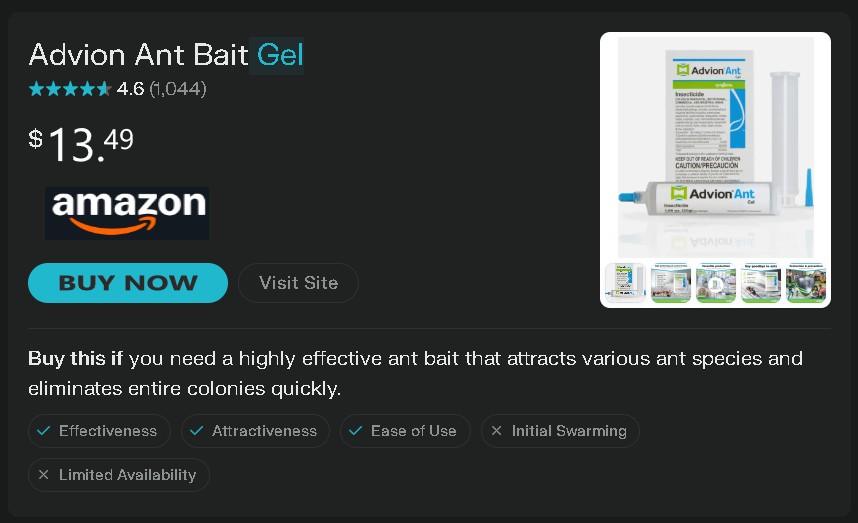
Advion Ant Bait Gel
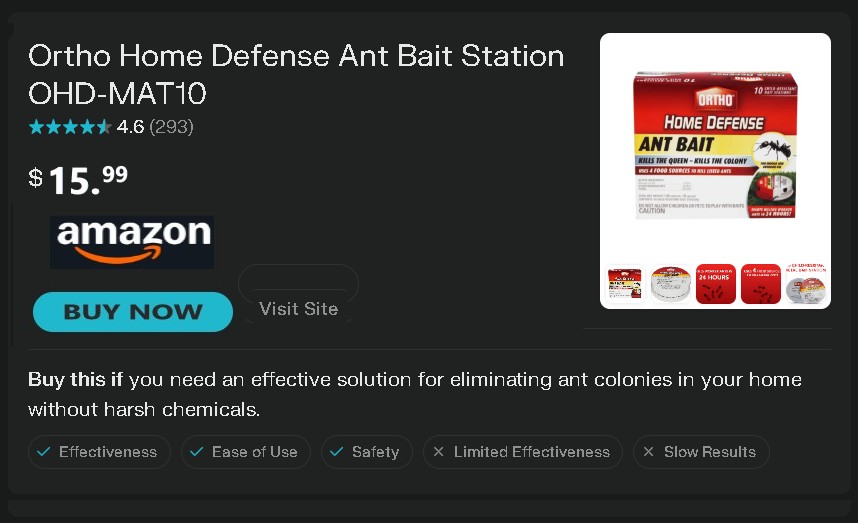
Ortho Home Defense Ant Bait Station OHD-MAT10
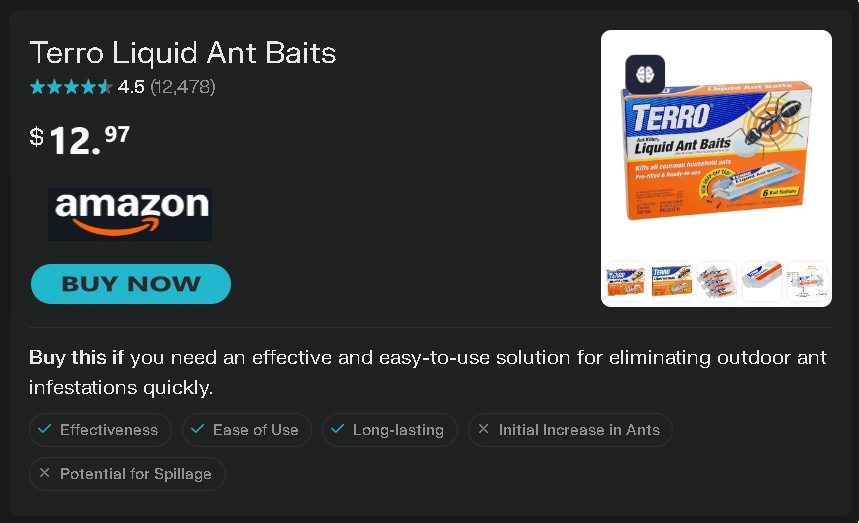
Terro Liquid Ant Bait
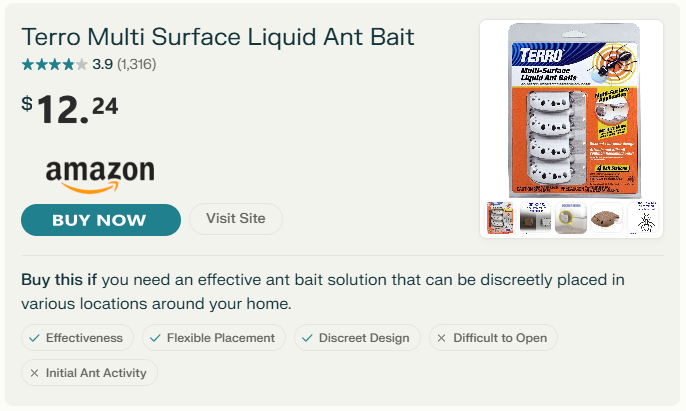
Terro Multi Surface Liquid Ant Bait
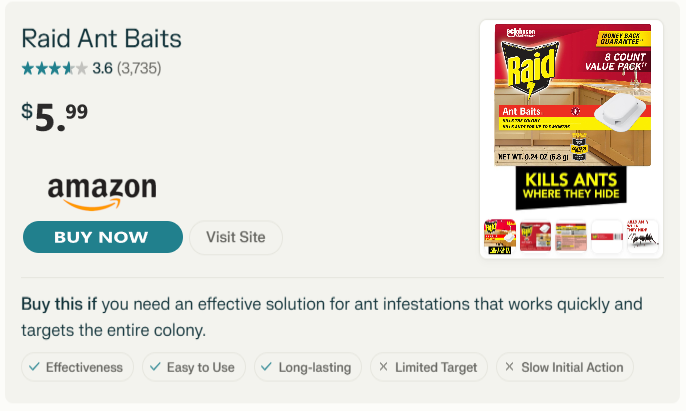
Raid Ant Baits
How effective are sticky ant traps compared to ant baits
Sticky ant traps and ant baits serve different purposes and have varying levels of effectiveness:
| Feature | Sticky Ant Traps | Ant Baits |
|---|---|---|
| Mechanism | Physically traps ants with adhesive surfaces. | Attracts ants to consume poison and carry it back to the colony. |
| Effectiveness | Captures individual ants but does not target the colony. | Targets and eliminates the entire colony, including the queen. |
| Speed | Immediate trapping of ants. | Takes days to weeks to eradicate the colony. |
| Best Use Case | Small-scale or localized infestations. | Larger infestations or when colony eradication is needed. |
| Safety | Non-toxic and chemical-free. | May contain chemicals but can be pet- and child-safe if used correctly. |
Ant baits are more effective for long-term control by targeting the colony, while sticky traps are better for quick, localized ant removal.
Can ant sprays be used in conjunction with ant baits for better results
Ant sprays can be used with ant baits, but careful strategy is crucial for effectiveness. Here are the key considerations:
Compatibility and Effectiveness
- Non-repellent sprays can be combined with ant baits more successfully .
- Indiscriminate combination of sprays and baits can reduce the overall effectiveness of ant control .
Best Practices
- Use non-repellent sprays that do not deter ants from taking bait back to their nest .
- Timing is critical: Consider applying baits first to weaken the colony before using sprays .
- Ensure the chemicals in baits and sprays are compatible and do not counteract each other .
Recommended Approach
- Start with ant baits to target the entire colony
- Use non-repellent sprays to manage visible ant populations
- Avoid repellent sprays that may disrupt bait effectiveness .
Caution: Always read product labels carefully and consider consulting a pest control professional to develop the most effective integrated pest management strategy .The goal is to simultaneously attack visible ants while eliminating the hidden colony through a strategic, combined approach .
Are there any natural alternatives to chemical ant sprays
Several natural alternatives can effectively control ant infestations without using chemical sprays:
Essential Oil Repellents
- Peppermint Oil: Mix 10-20 drops with 2 cups of water and spray around baseboards and windows .
- Tea Tree Oil: Combine 5-10 drops with water and spray or use saturated cotton balls .
- Cinnamon Leaf Oil: Place cotton balls soaked in oil in ant-prone areas .
- Lemon Eucalyptus Oil: Use saturated cotton balls in areas with ant activity .
Natural Deterrent Solutions
- White Vinegar: Create a 1:1 vinegar and water solution to clean surfaces and repel ants .
- Lemon Juice: Spray or wipe to remove pheromone trails and mask food scents .
- Citrus Peels: Place orange or lemon rinds in cupboards to deter ants .
Ant-Killing Natural Substances
- Diatomaceous Earth: A non-toxic powder that dehydrates and kills ants within 48 hours .
- Boric Acid: Mix with sugar to create a bait that eliminates the entire colony .
- Baking Soda: Combine with powdered sugar to create a fatal mixture for ants .
Safety Note: Always keep these solutions away from pets and children, and use them carefully to avoid potential irritation.
How long do ant baits typically take to eliminate an entire ant colony
The time it takes for ant baits to eliminate an entire colony varies depending on several factors:
Colony Size
- Small colonies: Typically eliminated in a few days to a week
- Large colonies: Can take up to several weeks for complete elimination
Bait Effectiveness
- High-quality baits like Ant Trax: Colony elimination in about 7 days
- Initial results: Noticeable reduction in ant activity within 24-48 hours for smaller infestations
Factors Affecting Timeframe
- Colony size and complexity
- Type of ant species
- Environmental conditions (temperature, competing food sources)
- Proper bait placement and non-interference with ant trails
Patience and Persistence
- Complete control may take up to 10 days for very large or multiple colonies
- Continuous monitoring and bait replenishment may be necessary
- Initial increase in ant activity around baits is a positive sign
It’s important to note that while you may see a reduction in ant activity within the first week, complete elimination of the entire colony typically takes longer. Experts recommend maintaining the bait stations for at least 3-4 days after noticing a decrease in ant activity to ensure thorough treatment

